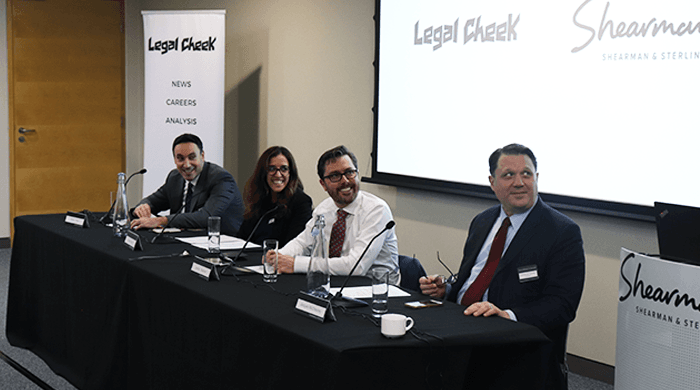Four Shearman & Sterling partners share their insights

With their soaring salaries and rapid expansion across London, business is booming for US MoneyLaw firms. What is the secret to their success in winning UK market share? This was the central question posed last week’s Legal Cheek commercial awareness event with the London office of elite US firm Shearman & Sterling.
First to offer insight was antitrust partner James Webber, who noted the importance of Wall Street roots. “New York is the largest and most profitable legal services market in the world, and if you generate profit successfully you can use this to then expand into other areas of profitability,” Webber explained to an audience of 60 students. Moving business across the pond is an obvious choice given London’s similarly profitable legal market. And with Shearman & Sterling having been in the UK capital since 1972 there are solid foundations on which to build.
“Deep relationships” with US financial institutes and corporate clients mean that when these organisations look to London for a “broader suite for legal services”, Shearman & Sterling is well-positioned. An example is in litigation. Webber observed that investment banks, notoriously susceptible to lawsuits, often bulk buy annual litigation packages from law firms. “This then provides an easy way of cross selling English litigation into that relationship,” he says.
For European finance partner Korey Fevzi, the competitive advantage that US firms enjoy internationally stems from the “entrepreneurial spirit” engrained in their DNA. In practice this means not waiting around for the phone to ring — lawyers at US firms must be driven to “get out there and build business”.
US law firms have an "entrepreneurial spirit", says Shearman & Sterling partner Korey Fevzi
Why do US law firms have such a big market share in London? It's because of their "entrepreneurial spirit" to "get out there and build business", says Shearman & Sterling LLP UK Graduates partner Korey Fevzi
Posted by Legal Cheek on Friday, 8 February 2019
As Webber explained, at US firms greater freedom tends to be afforded to partners to “pursue opportunities” and “group together organically”. They are not limited by the rigid management structure more typical of some UK firms, where partners are assigned a client cohort and performance is measured against a set of more tick-box objectives.
Such freedom, Webber continued, matters a lot in your professional life. “In my experience, a few of the people that left large magic circle firms to join US firms find that’s one of the most important factors in the move – more important than money actually,” Webber added.
A feature of this looser way of working is a lower ratio between partners and associates than UK firms. With fewer junior lawyers relative to partners, whose income derives from the stake they own in the firm, costs are lower. This is one of the reasons that US firms are not as under as much pressure as their British counterparts to incorporate efficiency-saving legal technology into their practices. Most, like Shearman & Sterling, are taking an interested yet cautious approach as they wait to see what works. As Webber put it, lawtech can result in “significant sunk costs” if the artificial intelligence software turns out not to work brilliantly.
A law firm isn't anything other than its "cultural glue" keeping its lawyers together
Shearman & Sterling LLP UK Graduates partner James Webber explains why "cultural cohesiveness" can make or break a law firm
Posted by Legal Cheek on Monday, 11 February 2019
The downside of smaller teams of associates is a culture of longer hours (the upside is of course fantastic pay!). What was abundantly clear throughout the evening was the high expectation that Shearman & Sterling has of its future trainees. Applicants must appreciate, as emphasised by capital markets partner Marwa Elborai, that being transactional lawyer means servicing the client comes first. Being handed something on Friday that a client needs by Monday morning obviously requires this mindset.
According to Shearman & Sterling LLP UK Graduates partner Jacques McChesney, aspiring commercial lawyers aiming for City law firms should learn basic accounting – the language of finance.
Posted by Legal Cheek on Thursday, 7 February 2019
Shearman & Sterling rookies must also be business-savvy. Capital markets partner Jacques McChesney offered a key piece of advice: learn the basics of financial accounting. “If your goal in life is to live and work in Paris, you’re going to learn French. If you’re goal in life is to work in one of the financial capitals in the world, you’re going to have to speak the language of finance – and the language of finance is accounting,” he said.
A law firm isn't anything other than its "cultural glue" keeping its lawyers together
Shearman & Sterling LLP UK Graduates partner James Webber explains why "cultural cohesiveness" can make or break a law firm
Posted by Legal Cheek on Monday, 11 February 2019
Having a strong grasp on what it means to be a lawyer at your chosen firm is fundamental to any successful application. As Webber stressed: “A law firm isn’t really anything other than the cultural glue that holds all the individuals in it together. It has no fixed assets; it doesn’t have any machinery; it doesn’t have any intellectual property. It’s just a group of people offering professional services — and the success or failure of that depends, in large part, on the social cohesiveness of that group of people.”
About Legal Cheek Careers posts.


